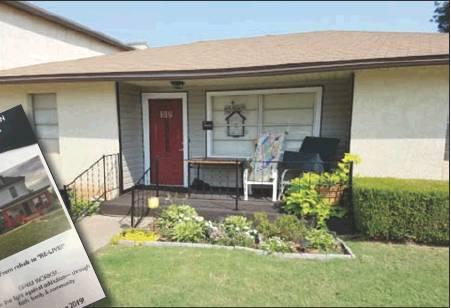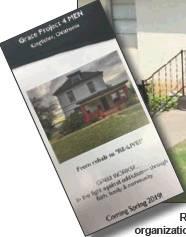Long-term recovery centers in works
Organizers say local need is great, respond to residents’ safety concerns
It’s a sobering fact.
Drug and alcohol addiction and related societal, family and personal costs are very real problems in Kingfisher County as well as elsewhere in the state and effective treatment solutions are often as expensive as they are scarce.
So when two different local ministries started making plans to open long-term residential recovery programs, their organizers expected demand to be high.
What they did not expect was the recent flood of social media backlash.
“I literally just got off an airplane and opened Facebook and found 225 comments on one post,” Pastor Debbie Bur-po of Frontline Ministries said.
Most of the concerns expressed – from declining property values to fears of drug addicts roaming the streets and interacting with nearby school children – are based on misinformation about how the church’s two long-term sober living facilities, one for men and one for women, will operate and who they will serve, Burpo said.
So in advance of appearing on a Kingfisher Planning and Zoning meeting agenda at noon next Thursday requesting an official greenlight for Journey Center Recovery, Frontline is hosting a public forum at 4 p.m. Sunday at its fellowship hall, 124 W. Erwin Ave.
“We invite anyone with any questions or concerns to come express those and hear what we’re about,” she said.
Kingfisher residents Jeff and Susannah Copeland, founders of Grace Projects Ministries Inc., will be opening a similar facility called Grace Projects 4 Men on property they purchased on College Hill northeast of Kingfisher.
Because the property is located outside city limits, no zoning laws apply, but the Copelands are still interested in allaying neighbors’ concerns and are contacting them directly to discuss their program.
In the meantime, both Bur-po and Jeff Copeland sat down with the Times and Free Press to discuss their programs.
Ministry
Expansion
Starting as a storefront church on Kingfisher’s Main Street in 2009 before moving to its current building on Erwin Avenue, Frontline Ministries has followed a calling exemplified by its name.
From the very beginning, Burpo, her board members and congregation have stationed themselves on the front lines of societal problems – from feeding and clothing the homeless, to operating a local food pantry and soup kitchen, to setting up a thrift store.
The church has been no less hesitant to jump into the battle against drug and alcohol addiction.
“Since we started the church, we’ve operated an outpatient 12-step recovery program and all that time we’ve watched people struggle to find a place in long-term residential facilities that they can afford,” she said.
“We saw so many people cycle back through our program again and again because they continued to live in the same environment that created their addiction in the first place.”
Waiting lists are long at government-subsidized facilities and private pay residential treatment can cost up to $30,000 a month, she said.
Developing a structured, faith-based and curriculum-centered 12-to-18-month residential sober living program seemed a natural extension of the church’s existing ministry, and one that congregation members have been willing to support through donations collected for that purpose.
Associate Pastor Ron Porter, formerly associated with Adult and Teen Challenge, a similar faith-based residential ministry, oversees the church’s outpatient recovery program and will serve the same function with the residential facilities.
The men’s home, which the church hopes to open in April, will be located across the street from the church in the building where church offices are currently housed.
If all goes well, the women’s home, to be located adjacent to the church in the house where the thrift store is currently located, will open in October, Burpo said.
Each facility is expected to house six to eight adults who are clean and sober when they enter the program and are regularly drug-tested to make sure they stay that way, she said.
“Everyone who applies will be subjected to an extensive screening process,” Burpo said. “We won’t accept sex offenders or anyone with a history of violence.”
Those who are accepted will be charged a $1,200 fee, which will cover room, board and all incidental expenses for their entire 12-18-month stay.
“That also ensures that those who apply really want to change their lives and be free of their addiction,” she said.
The program will involve a regimented and structured daily schedule of classes addressing personal issues such as anger management and addictive behaviors as well as basic life skills such as budgeting, obtaining a GED, parenting and rebuilding family relationships.
Church attendance will be mandatory, as well as instruction in Christian values and principles.
Participants also will be expected to work in and around the church on lawn care and janitorial duties and also will be available for community service projects.
“Part of what we want to do is get them re-integrated and engaged in the community in positive ways,” she said.
And all of that activity will be under 24-hour supervision.
“From the outside, these two houses will look no different than any other residential house on the street,” she said.
In response to concern about children’s safety, due to the proximity to schools located in the neighborhood, Burpo pointed out that children are more likely to be endangered by unaddressed addiction issues in their families that leave them vulnerable to neglect and even abuse.
“Our church averages 60-70 children in our Wednesday night programs every week. We would never create a safety risk that endangers them,” she said. “The people in our program are recovering addicts, not child predators, and in addition to maintaining security, we will be keeping them too busy to get into trouble.”
Participants who use drugs while in the program will be automatically out and have to go through the entire application process again, including maintaining a period of sobriety, to be allowed back in, she said.
The two recovery houses are part of several new community developments ongoing at the church. Another is a new Family Life Center being constructed north of the existing building, which will include a gymnasium, commercial soup kitchen and classrooms for after-school programs, tutoring, GED and parenting classes and space for community events.
“It will be a beautiful building which will improve the looks of our neighborhood as well as be a true asset for Kingfisher,” Burpo said, adding that the recovery houses are intended to serve as another avenue of positive outreach to benefit the community.
“We urge anyone with any concerns to come to our meeting Sunday or just give us a call,” she said.
Another Approach
In the 11 years he has been clean and sober, Jeff Copeland has devoted himself to helping others find a path out of their addictions.
“I’ve been counseling men on and off for seven years, including inside DOC,” he said. “I’ve been able to weigh what works and doesn’t work.”
Like the homes planned by Frontline, Copeland said Grace Projects 4 Men won’t be a detox facility.
“If someone is at that point in their addiction, they require medical intervention and that’s not what we’re here for,” he said. “Success in our program begins with a desire to change, which is demonstrated by a period of sobriety before participants will be admitted.”
Violent and sexual offenders also will be screened out, he said.
Rather than charge a fee for the program, Copeland said every participant would be expected to work at a job, with a portion of their wages going toward the program’s operating expenses.
“The rest of what they earn will be held for them so that when they leave, they’ll have seed money along with the marketable skills they’ve learned on the job,” he said.
Copeland has been making connections with employers in the Kingfisher area who will be willing to hire and train residents from his program.
His facility will provide transportation to and from work, along with keeping tabs on how participants are performing at job sites, he said.
That’s the third leg of his program, which also focuses on developing a foundation of faith and rebuilding families, he said.
“Drug addiction is a stagnant existence, spiritually, socially and financially,” Copeland said. “We want our graduates to leave not just sober but with the tools to succeed and the desire to reach out to others.”
With the aid of his advisory board, which includes Kingfisher Nazarene Church Pastor Jeff Liles, Todd Blair and Chris Blair, Copeland said he’s developed a three-year business plan which shows his program to be not only self-supporting, but capable of expanding to include a women’s facility at the end of the three-year period.
For now, the men’s facility will house about 15 residents and is expected to open sometime this spring.
In addition to jobs and job training, Copeland’s program will provide transportation to the local church service of each resident’s choosing and nightly classes, including group Bible studies that also involve residents’ family members and separate groups for children.
“We want to create or rebuild those family bonds that have been damaged by addiction and create a sense of family for those who don’t have one,” he said.
In addition to Copeland, the facility will include four additional staff members, he said.
“We’ll have overlapping shifts so that we can maintain continuity and we are going to have strict documentation of all activities,” he said.
The program also will include follow-up of each resident’s progress after he graduates from the program, “ideally for a year,” he said.
Copeland encourages anyone with questions or concerns to email him directly at graceprojectministries@gmail.com.


